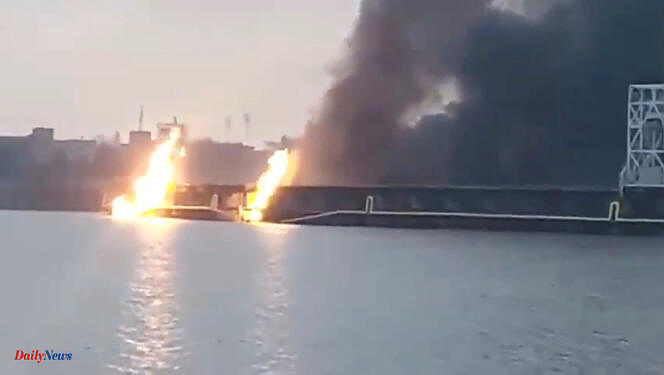Ukraine's largest hydroelectric power station, located on the Dnieper, was hit on Friday March 22 by eight Russian missiles which inflicted "very significant damage" without causing any immediate danger to the population, the Ukrainian prosecutor's office said.
The missiles hit the power plant located north of the city of Zaporizhia (South), and caused it to be shut down, Yuri Belousov, head of war crimes investigations at the Ukrainian Prosecutor General's Office, explained on television. while ensuring that there was no risk of the dam breaking.
“This is the most massive attack on energy facilities in the past year, that’s for sure,” Belousov said, according to Ukrainian media Censor.net. We can say that with today's attack the Russians have repeatedly attacked 136 energy facilities in Ukraine since the full-scale invasion. »
As a result of this attack, a “large-scale” leak of hydrocarbons into the Dnieper occurred, according to the State Environmental Inspectorate.
At the same time, explosions rang out in kyiv, Kharkiv, Odessa and Lviv. Russian bombings killed five people and injured around twenty others in the Zaporizhia (South) and Khmelnytsky (West) regions during the night from Thursday to Friday.
Power cuts
The Russian army claimed to have acted in retaliation for recent attacks on territories bordering Ukraine, which were themselves responses to the daily bombing of Ukrainian cities. In Moscow, Russian presidential spokesperson Dmitry Peskov admitted that Russia was “in a state of war.”
According to Ukrainian President Volodymyr Zelensky, the targets of this attack were “power plants, high-voltage lines, a hydroelectric dam, residences and even a trolleybus.” These strikes led to power cuts in at least seven Ukrainian regions and damaged “dozens” of installations, noted the Ukrainian operator Ukrenergo.
Ukraine's second city, Kharkiv, which had nearly a million and a half inhabitants before the war, is deprived of electricity and heating because the bombings have "severely damaged" the energy infrastructure, its mayor lamented. , Ihor Terekhov, believing it to be the “most powerful” attack on his city since the start of the war.
Ukrainian Energy Minister German Galushchenko, for his part, judged that this night raid had been “the biggest attack against the Ukrainian energy industry [launched] in recent times”.
The French foreign ministry, Stéphane Séjourné, condemned the strikes “with the greatest firmness.” “These strikes (…) constitute a new violation of international law by Russia, which relentlessly pursues its strategy of intimidation against Ukraine and its supporters, with disregard for the lives of Ukrainian civilians,” he said. -he clarified.












